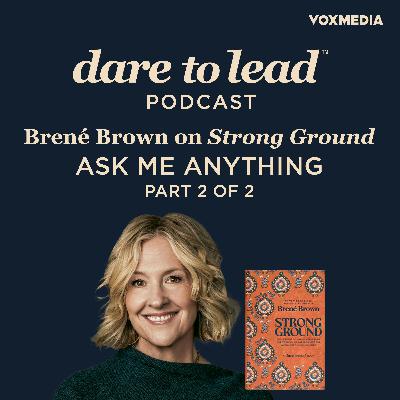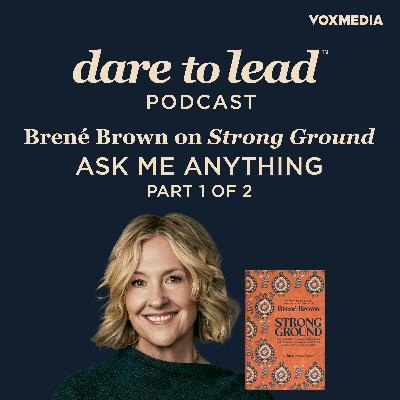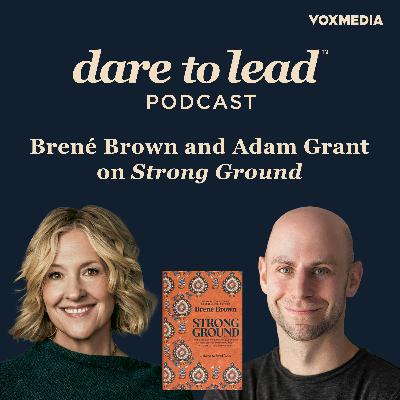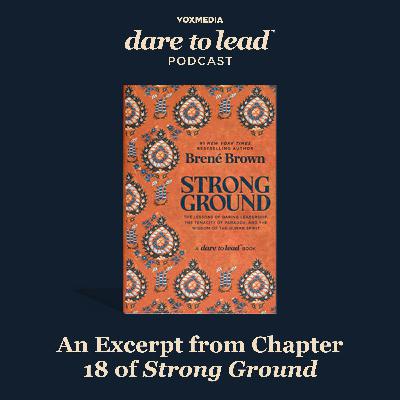Discover Dare to Lead with Brené Brown
Dare to Lead with Brené Brown

Dare to Lead with Brené Brown
Author: Vox Media Podcast Network
Subscribed: 2,288Played: 15,110Subscribe
Share
© 2024
Description
In this special series on Brené's new book, Strong Ground, Brené and special guest Adam Grant break down some of the big issues in the book and walk listeners through new research on what it means to be bold in the midst of unrelenting instability and complexity. The real fun is listening to them learn, unlearn, debate, and disagree. Join Brené and Adam for this six-episode series launching every Wednesday starting September 17th.
86 Episodes
Reverse
In the second part of an Ask Me Anything episode around Strong Ground, Brené shares an excerpt from the Strong Ground audiobook that walks listeners through the one topic that elicited the most questions — the Above/Below the Line practice. This is one of the most profound self-awareness tools we discovered!
Learn more about your ad choices. Visit podcastchoices.com/adchoices
In part one of an Ask Me Anything episode around Strong Ground, Brené answers questions from listeners about mindset shifts, leading from where you are, and courage and boldness in uncertain times. She highlights the importance of pausing during big decisions where action is not always impact, breaks down how to be courageous when it’s not the popular choice, and emphasizes the role of curiosity and thoughtfulness when moving through uncertainty and overwhelm.
Learn more about your ad choices. Visit podcastchoices.com/adchoices
In the final episode of a special “Dare to Lead” series with Adam Grant, Brené and Adam discuss the problem with rewarding all effort as excellence. Instead, leaders should reward effort that is not leading to success or mastery with their time through coaching, mentoring, and sharing their own experiences of transformation and change. They also explore how to approach decisions based on how consequential and reversible they are and highlight the role that leaders play in setting up others for success by making sure their team has what they need.
Learn more about your ad choices. Visit podcastchoices.com/adchoices
In the fifth episode of a special “Dare to Lead” series with Adam Grant, Brené and Adam break down the skillsets of empathy, empathy misses, and how empathy is trickier than walking in someone else’s shoes. They discuss the way empathy can show up as being curious and caring — irreducible prerequisites for good leadership. Brené shares a powerful sentence for leaders building an empathy skillset: “What does support from me look like right now?”
Learn more about your ad choices. Visit podcastchoices.com/adchoices
In the fourth episode of a special “Dare to Lead” series with Adam Grant, Brené and Adam explore the attack on empathy, the difference between cognitive empathy and affective empathy, and what separates empathy from enmeshment. Brené shares a personal story that led to a breakthrough around how to stay aligned with empathy and perspective taking instead of over-identifying and finding yourself in enmeshment — the feeling of not knowing where you end and someone else begins. They also discuss how living in an image-heavy world can affect the way we engage with empathy.
Learn more about your ad choices. Visit podcastchoices.com/adchoices
In the third part of a special series with Adam Grant, Brené and Adam tackle the topics of time scarcity, how a great leader doesn’t have all the right answers, but the right questions, and the difference between pocket presence and executive presence. They dig into how understanding the 5 Cs — color, context, connective tissue, cost, and consequence — of delegation and strategy operations can build the situational awareness, temporal awareness, systems theory, and critical thinking skills necessary for pocket presence. In their discussion, Adam shares his breakthrough of seeing pocket presence as a collective capability, whereas executive presence is “party of one.”
Learn more about your ad choices. Visit podcastchoices.com/adchoices
In part two of a special series with Adam Grant on Brené’s new book, Strong Ground, Brené and Adam discuss the far and near enemies of generosity, the tug of war of paradox, and sports as leadership theater. They explore how finding our strong ground offers tethering, connection, and stability, and also the platform for explosive movement and change.
Learn more about your ad choices. Visit podcastchoices.com/adchoices
In this special Dare to Lead episode, Brené shares one of her favorite chapters from the Strong Ground audiobook called Lock-In and Lock-Through Power. Brené uses the metaphor of a boat lock to explore the tricky work-to-home and professional-to-personal transitions that we have to navigate with our partners, children, and friends. She digs into why, at the end of a hard day, when we finally arrive home, we stay in our cars and scroll through TikTok rather than going inside, and how an intentional "locking through" process allows us to rise or lower to a new and different rhythm as we make daily transitions. And, after visiting the Teddington Lock in London and getting a lesson from the local lock keeper, she shares why moving too fast through these transitions often results in relational capsizing.
Learn more about your ad choices. Visit podcastchoices.com/adchoices
In the first episode of a special series on Brené's new book, Strong Ground, Brené and Adam dig into the origins of Strong Ground, and what values clarity can mean for individuals, teams, and organizations. They take on the question of why there is so much more meaning in our lives and our work when we know who we are and what matters to us the most.
Learn more about your ad choices. Visit podcastchoices.com/adchoices
In this episode Brené and Barrett discuss their learnings on AI and social media and some of their favorite nuggets from each of the guests in the series.
Learn more about your ad choices. Visit podcastchoices.com/adchoices
In this episode, Brené and Dr. Joy discuss fighting bias in algorithms, Gender Shades - the accuracy of AI powered gender classification products, and her amazing perspective on technology as a poet, artist, and scientist.
Learn more about your ad choices. Visit podcastchoices.com/adchoices
In this episode, Brené and Lisa discuss how we can work to close the digital divide and ensure more people have access to technology, what it means in AI speak to have a human in the loop, and the incredible ways teachers, business owners, and regular people are using AI.
Learn more about your ad choices. Visit podcastchoices.com/adchoices
Quantitative futurist Amy Webb talks to us about the three technologies that make up the "super cycle" that we're all living through right now: artificial intelligence, wearable devices, and biotechnology, and why, despite the unnerving change, we still need to do some serious future planning.
Learn more about your ad choices. Visit podcastchoices.com/adchoices
In Part 2 of my conversation with Paul Leonardi and Tsedal Neeley, authors of The Digital Mindset: What It Really Takes to Thrive in the Age of Data, Algorithms, and AI, we talk about the importance of establishing a baseline digital literacy in our organizations and the intimate relationship between the skill sets and the mindsets we cultivate.
Learn more about your ad choices. Visit podcastchoices.com/adchoices
This two-part podcast with Paul Leonardi and Tsedal Neeley is an absolute game changer. Given how often I find myself working with leaders who are knee-high in uncertainty and vulnerability around digital transformation, I thought I had a pretty solid understanding of it. But The Digital Mindset book and this conversation turned everything upside down.
Learn more about your ad choices. Visit podcastchoices.com/adchoices
We’re back with Part 2 of my conversation with Mike Erwin, the founder and CEO of the Character and Leadership Center and the co-author of Leadership Is a Relationship. In this episode, we continue to dig into how the most effective leaders prioritize relationships. They give feedback that calls attention to the behaviors they want to encourage, invest in the slow work of pulling and keeping people together, and navigate the trickiness of loyalty, a state that, if it starts to move us out of our values, can become transactional, not relational.
Learn more about your ad choices. Visit podcastchoices.com/adchoices
This is the first of two episodes with Mike Erwin, the founder and CEO of the Character and Leadership Center and the co-author of Leadership Is a Relationship, a timely book that details why leaders who prioritize relationships are more effective. It’s a conversation about the seven functions of relationship-building and the importance of prioritizing our relationships as people and also as leaders.
Learn more about your ad choices. Visit podcastchoices.com/adchoices
I won’t lie: This conversation was hard as hell. But — I’m so grateful to Lisa Lahey and all the work she and Robert Kegan have done on the “immunity to change” theory. It explains why lasting, meaningful change is damn hard. Rather than simply talking about the process, Lisa and I actually engage in it around something I’m desperate to change (and somewhat refusing to change). She is so skilled at asking questions and framing conversations — this is a MASTER class
Learn more about your ad choices. Visit podcastchoices.com/adchoices
I don’t like to think of myself as someone who’s averse to change. But, man, am I averse to change. Enter the amazing Lisa Lahey. She is a Harvard Graduate School of Education faculty member who has built a body of work to help learners and leaders overcome the innate human aversion to change. And I thought, when I asked her to join us for a two-parter on this podcast, that we’d talk about the “immunity to change” theory — how change happens, why it’s so hard — from an academic perspective. Instead, she walks me through a very personal struggle around something in my life that I’ve desperately wanted to change but just seemingly cannot.
Learn more about your ad choices. Visit podcastchoices.com/adchoices
Barrett and I invite you into some research thinking and dig into the latest data on how to build brave spaces with our teams — what gets in the way of people showing up, what gets in the way of doing the work, and how judgment is the primary killer of these spaces.
Learn more about your ad choices. Visit podcastchoices.com/adchoices









Great book.